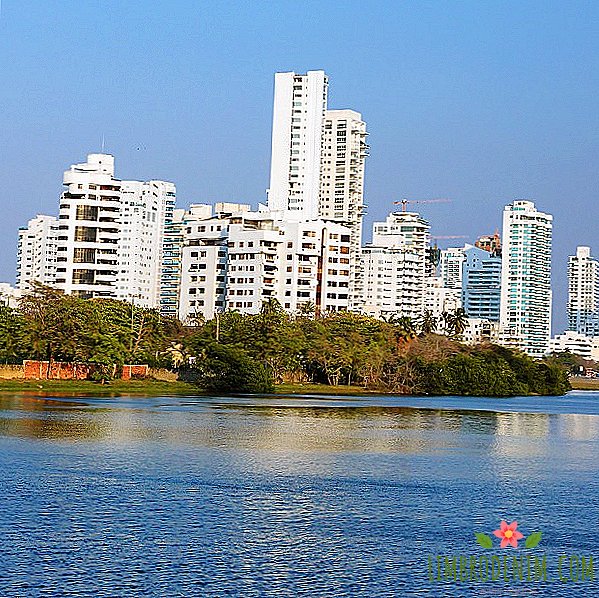How I left for Colombia and launched my waffle bar
In October 2014, I went to Latin America for a year.. The region attracted me with its obscurity and remoteness. I started saving for the biggest adventure in my life long before my departure. She first put off wages, working in a trade marketing business of a large company, and then participated in various summer city festivals with my waffle project The Bakersville. I was planning to travel from Mexico to Argentina, but on the way I realized that there was no point in pursuing quantity - it was much more interesting to travel in my rhythm, stopping to live in places I liked.
I worked in a hostel in the cozy colonial town of San Cristobal in southern Mexico, learned to paint ceramics at a small factory in Guatemala, built a house of natural materials on a farm in Nicaragua, cooked food for tourists and collected coconuts in the morning on the island of San Blas in Panama . As a result, in eight months I traveled to Mexico, Guatemala, El Salvador, Honduras, Nicaragua, Costa Rica, Panama, and traveled by boat to Colombia. For the next three months I traveled around Colombia and was absolutely delighted with people, the beauty of nature, the diverse landscape and the rich culture.

I fell in love with Cartagena at first sight: colorful houses with balconies, blue water of the Caribbean Sea, magnificent sunsets, live music in the squares and insanely friendly people
Cartagena became my base in Colombia, from where I traveled to other cities. I fell in love with her at first sight: colorful houses with balconies covered with creeping plants, crystal blue waters of the Caribbean Sea and islands in an hour's journey, sundown sunsets, live music in the squares, regular festivals of contemporary dance, cinema, orchestras and insanely friendly people . It was difficult to leave the country, all the time there were reasons to stay: the four-day trekking to the lost settlement, which should not be missed, the friends invited to the house on the hill with a gorgeous view of the coffee plantations, the freediving course, which they had long wanted to go.
On the freediving course, I met Sylvia, a freckled girl with curly hair and beautiful tattoos. After two days of diving camp on Cholon Island, we went with her to celebrate receiving certificates for a party on the roof of the hostel. There, Sylvia introduced me to her friend José, a tall, tanned handsome man with broad shoulders and a snow-white smile. After some time, when I continued to travel inland, gradually approaching Ecuador, I accidentally met him again. We moved with him from one romantic city to another by bus, and we had an interesting conversation: José suggested that I stay in Cartagena and open a branch of my Moscow waffle bar, and at the same time get to know him better. I thought: "Why not?". Trying to do business in a city that I liked so much seemed to me much more interesting than visiting another country. In the same bus I made a decision: everything, I am going to live in Cartagena.
Returning to the city, I immediately set about building a food map. I remember how I got off the bus in the company of my friend Miguel and rushed off to the workshop for working with stainless steel. He stopped me: "Where are you running so? Get used to moving slowly, otherwise you will sweat a lot and get tired quickly." I soon realized what he meant. The year round in Cartagena is unbearable heat, so everything is done very slowly. At lunchtime, from twelve to two, when the temperature reaches its highest point, the city stops altogether: no one is on the roads, all the enterprises are closed, no one answers the phones - siesta. The second siesta is a broadcast of football, the holy of holies for Colombians. More than half of the population on the day of the match is in the form of a national team, asking for leave or simply leaving work to watch the competition. The third good reason not to work is rain. Because of all the above, the construction was delayed for two months instead of the one I had planned. Almost every day I had to come to the workshops to control the work.
Effort cost the result: my waffle stand was incredibly beautiful. As it turned out, the biggest difficulty was still waiting for me to come. In Cartagena, at every corner, someone sells something: coconut water, hot dogs, burgers, soft drinks, fruits, arepas (cornmeal cakes), cigarettes, traditional fried fritos or kebabs on small skewers. At the same time, as I found out already in the process, street trading in Colombia is illegal. If you constantly move around, everything is in order, but to park for several hours in one place (as, by the way, the majority still does) is prohibited. Since electricity is needed for a waffle iron, I cannot move constantly, so I fall into the category of illegal immigrants. The order is followed by the Ministry of the Environment, Housing and Spatial Development of Colombia. Men in black suits at any time can appear on the square and confiscate your stand. This somehow happened to me when I left my employee selling waffles, and she herself went to freediving on the islands of San Andres and Providencia.
Naturally, I asked for permission to trade from the city authorities, but in nine months I did not receive it. However, the refusal did not come to me either. I realized that many issues here are solved differently. On the one hand, I found out that an unofficial authority is held by a local businessman, about whom a lot of rumors circulate: some say that he is a mafioso who is involved in drug trafficking and kills people, others - that he is just very rich and talented, therefore many people envy him and spread about him scary gossip. In any case, I decided to meet him and ask for his support. He opened a restaurant in the square where I worked, and periodically came to check how construction was going. On one of these days, I made waffles, went over to introduce myself and told him with burning eyes how I built the food cards of my dream, and now I’m not allowed to work. Without asking for anything in return, he promised to help.
On the other hand, I realized that a big role in the success of your business is also played by whether the community of the barrio-district accepts you. I decided to make a contribution: I repaired the tiles that had fallen off on the square with my own money, I organized a free origami master class with the subsequent eating of waffles for the children of the district, I took part in several subbotniks. I do not know what exactly worked (probably a combination of all the actions taken), but the police and the ministry no longer bothered me.
There are many business opportunities in Colombia and it is quite easy to get a visa and a work permit. True, you have to learn Spanish - nowhere without it. I got it somehow by itself. I have never taken language lessons. At first I played with the Busuu application on my phone, checked on the Internet how the verbs conjugated, tried to communicate all the time - and learned to speak. I recorded the words by ear, and the iPhone automatically corrected all my mistakes - this is how I learned to write.
Arriving here with the American currency, you feel royal, but when you start earning in pesos, everything no longer seems so cheap
What I like a lot about Colombia is Caribbean culture with its music and dancing, be it mini-orchestras with perky drums and wind instruments, exciting salsa or aggressively sexy champaign. Chambeta is both a musical genre and a dance brought to Colombia by African slaves. Since people were shackled in their feet, the champhet is often danced with narrowed ankles. In general, chambeta is the name of a short machete knife used by fruit vendors, in fact, a symbol of the poor. Over time, the dance became popular outside the poor areas. Now it is a powerful part of the culture of the Atlantic coast of Colombia, and the funniest parties are the ones where they play and dance champaign.
Another reason to fall in love with Colombia once and for all, especially Cartagena, is unusually friendly and friendly people. Almost every morning, a guard at my house asks how you slept, how are things with me and with José, wondering what is new with us. The cashier in the district supermarket knows me by name, and each of my visits records a new Russian word. On the street you constantly meet acquaintances, it is customary to stop and chat with everyone - probably, therefore, rarely anyone comes to the meeting on time.
One day, a cashier in my big supermarket said to my exasperated remark: “Is it possible to quickly punch products? Look at the queue,” answered me: “My dear, where are you in a hurry? Look where we are: here the land ends, then only the sea, nowhere to run.” What can I say? There is something beautiful about it. By the way, at first I was very surprised by this manner of addressing: “mi reina” - “my princess”, “nena” - “child”, “mi vida” - “my life”, “linda” - “beauty”, but with time I got used to Also, I was no longer surprised by the treatment "negrito" - "black", "flaco" - "thin", "gordo" - "fat", "loco" - "crazy", "viejo" - "old". In my opinion, in this diversity lies the beauty.
Sea outside the window, year-round tropical fruits, a magical old town with its colorful houses, on weekends - salsa in a bar with a huge collection of old music and small balconies or in the open air, friendly people - a perfect picture is drawn. In fact, not so good. Cartagena - is the main tourist city of Colombia, which makes it the most expensive, and on holidays in the center is not crowded. In addition, they mostly come here for the sake of not the most intellectual tourism: to break away, to try drugs - to watch it is sad.
Historically, this city was a transit point: pirate ships moored to it, sailors went to land in search of women, slaves from Africa were brought here, here the Inquisition burned thousands of innocent women on huge fires. All this heavy energy is in the air of the city. Another disadvantage is very small salaries: cleaners, cashiers, waiters earn $ 150-250 a month, and office managers earn $ 300-800. Coming here with the American currency, you feel like a king, but when you start earning in pesos, everything no longer seems so cheap. If you suddenly want to go on a trip to Europe or go home to visit family and friends in Russia, you will have to sweat.
As for my plans for the future, I'm not going to stay in Colombia for life. I would like to live in another place - for example, in Buenos Aires, Los Angeles or Bali. In August, it was one year since I live in Colombia, and two years since I left Russia, and during that time I learned a lot. Moving to another country no longer seems to me something terrible and impracticable. I think a lot more obstacles in our heads: now I understand that people live very differently, and everyone defines success in their own way. Now I understand that the countries of Latin America are not at all what they are often described in the media, and there are so many interesting things in the world that it’s just a sin not to go on another adventure.
Photo: galina_savina - stock.adobe.com, galina_savina - stock.adobe.com





